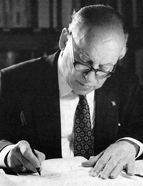

Believing he had found the stability he desired in his professorship, he was surprised in October 1973 by Marcelo Caetano’s invitation to become Rector of the University of Lisbon. However, he sensed that the times were not favourable for the task to be an easy one. He accepted the position more out of personal loyalty than conviction, as he was fully aware of the tense political climate of opposition to the regime at the time. And, in fact, a few days later, the Revolution of 25 April broke out, abruptly interrupting his career. He submitted his resignation as rector on the 26th, which was accepted on the 29th. On the same date, he was dismissed from teaching at the University, in a purge carried out in the name of democracy.
Deeply shaken by his dismissal from the teaching profession, which he considered a revolting act of injustice, the Portuguese Academy of History provided him with a space to continue his work as a historian, researcher and man of action. He had been a Corresponding Member since July 1960 and was elected Full Member in 1968. In February 1975, his peers elected him President, considering that his experience could be useful in setting a more dynamic course and confronting the adversaries to its existence. Veríssimo Serrão took up the challenge and committed himself to giving it a vigorous and innovative scientific impetus. He broke with the traditional style of the Academy, imposing a new course of action in line with his personality, which he defined as follows: “I am a man of will who does not give up on the projects that inspire him” (Correspondence with Marcelo Caetano, p. 336). And in a short time, the signs of change became visible: “Life in the past was one of closed-door sessions attended by a handful of academics, with admission restricted to researchers without any work to their name and leaving out names of national prestige; I cannot and will not accept this situation” (Idem, pp. 106-107). He adds in another passage: “Now we are throwing open the doors of the Academy so that people can judge the value of the communications we present and the national objectives that the Academy can fulfil” (Idem, p. 75). Two years later, he presented the results: “we hold regular sessions attended by 25 to 30 academics – something never seen before at the Palácio da Rosa – and an audience that follows the debates with interest” (Idem, p. 77). This course of action silenced the voices that opposed its existence.
This work is financed by national funds through FCT - Foundation for Science and Technology, I.P, in the scope of the projects UIDB/04311/2020 and UIDP/04311/2020.
